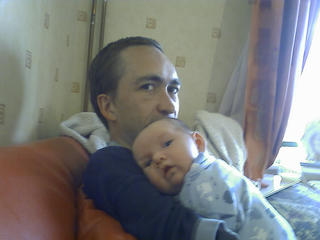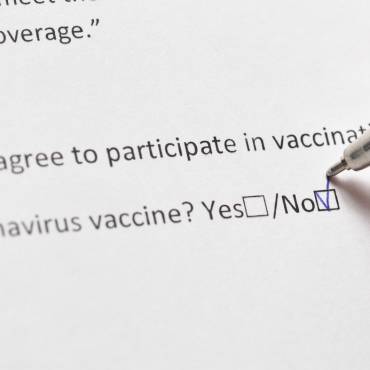
Early childhood immunizations have been viewed as promoters of asthma development by stimulating a TH2-type immune response or decreasing microbial pressure, which shifts the balance between TH1 and TH2 immunity.
Objective
Differing time schedules for childhood immunizations may explain the discrepant findings of an association with asthma reported in observational studies. This research was undertaken to determine whether timing of diphtheria, pertussis, tetanus (DPT) immunization has an effect on the development of childhood asthma by age 7 years.
Methods
This was a retrospective longitudinal study of a cohort of children born in Manitoba in 1995. The complete immunization and health care records of cohort children from birth until age 7 years were available for analysis. The adjusted odds ratio for asthma at age 7 years according to timing of DPT immunization was computed from multivariable logistic regression.
Results
Among 11, 531 children who received at least 4 doses of DPT, the risk of asthma was reduced to ½ in children whose first dose of DPT was delayed by more than 2 months. The likelihood of asthma in children with delays in all 3 doses was 0.39 (95% CI, 0.18-0.86).
Conclusion
We found a negative association between delay in administration of the first dose of whole-cell DPT immunization in childhood and the development of asthma; the association was greater with delays in all of the first 3 doses. The mechanism for this phenomenon requires further research.
Key words: DPT combination vaccine, childhood asthma, retrospective birth cohort, administrative health data
Abbreviations used: DaPT, Diphtheria, acellular pertussis, tetanus, DPT, Diphtheria, pertussis, tetanus, ICD-9, International Classification of Diseases, Ninth Revision, MIMS, Manitoba Immunization Monitoring System, MHSIP, Manitoba Health Services Insurance Program, OR, Odds ratio.
Source: Delay in diphtheria, pertussis, tetanus vaccination is associated with a reduced risk of childhood asthma, The Journal of Allergy and Clinical Immunology, Volume 121, Issue 3, Pages 626-631 (March 2008).
Put in plain English!
5,000 of these babies started their jabs at 2 months old and 13.8% of them developed asthma.
In the babies who were 4 months old or older at the time of their first vaccination, there were only 5.9% who developed asthma.
The study also found a decreased incidence of asthma if the subsequent doses were delayed, but the strongest evidence for this was with the first dose.
The journal revealed that a staggering 12% of children go on to develop asthma after vaccination.
In spite of this evidence, they do not intend to change the vaccination schedule.
Parents of Unvaccinated Children Report Less Asthma
WOW! A study which looks at the health of the unvaccinated – this is 2nd study I have read on the subject. Doctors don’t normally study the unvaccinated
In the last 3 decades, there has been an unexplained increase in the prevalence of asthma and hay fever.
Objective
We sought to determine whether there is an association between childhood vaccination and atopic diseases, and we assessed the self-reported prevalence of atopic diseases in a population that included a large number of families not vaccinating their children.
Methods
Surveys were mailed to 2964 member households of the National Vaccine Information Center, which represents people concerned about vaccine safety, to ascertain vaccination and atopic disease status.
Results
The data included 515 never vaccinated, 423 partially vaccinated, and 239 completely vaccinated children. In multiple regression analyses there were significant (P < .0005) and dose-dependent negative relationships between vaccination refusal and self-reported asthma or hay fever only in children with no family history of the condition and, for asthma, in children with no exposure to antibiotics during infancy. Vaccination refusal was also significantly (P < .005) and negatively associated with self-reported eczema and current wheeze. A sensitivity analysis indicated that substantial biases would be required to overturn the observed associations.
Conclusion
Parents who refuse vaccinations reported less asthma and allergies in their unvaccinated children. Although this relationship was independent of measured confounders, it could be due to differences in other unmeasured lifestyle factors or systematic bias. Further research is needed to verify these results and investigate which exposures are driving the associations between vaccination refusal and allergic disease. The known benefits of vaccination currently outweigh the unproved risk of allergic disease.
Nashville, Tenn, London, United Kingdom, and Chicago, Ill
Key words: Immunization, asthma, allergic rhinitis, eczema, prevalence, cross-sectional survey
Abbreviations used: DTP, Diphtheria, tetanus, and pertussis, HiB, Haemophilus influenzae B, MMR, Measles, mumps, and rubella, NVIC, National Vaccine Information Center, RR, Rate ratio.
Source: The Journal of Allergy and Clinical Immunology, Volume 115, Issue 4, Pages 737-744 (April 2005).
VAN UK’S Comment: I have no doubt that lack of antibiotics and antipyretics would also decrease asthma and is a factor in addition to non-vaccination, however, other studies have linked vaccination with asthma, so this shouldn’t be ignored.
As a mother of unvaccinated children I can say that if my child was having difficulty breathing, I most certainly would get him seen by a doctor, as would other mothers, so I don’t think the low asthma rate is due to not reporting to the GP.
Kinetics of asthma- and allergy-associated immune response gene expression in peripheral blood mononuclear cells from vaccinated infants after in vitro re-stimulation with vaccine antigen.
Abstract
The global expression of immune response genes in infants after vaccination and their role in asthma and allergy is not clearly understood. Pharmacogenomics is ideally suited to study the involved cellular responses, since the expression of thousands of genes can be assessed simultaneously. Here, array technology was used to assess the expression kinetics of immune response genes with association to asthma and allergy in peripheral blood mononuclear cells (PBMC) of five healthy infants after vaccination with Infanrix-Polio+Hib. At 12h after in vitro re-stimulation of the PBMC with pertussis toxin (PT) antigen, 14 immune response pathways, 33 allergy-related and 66 asthma-related genes were found activated.
Source: Vaccine. 2008 Mar 25;26(14):1725-30. doi: 10.1016/j.vaccine.2008.01.041. Epub 2008 Feb 13.
In the above study, vaccines activated 33 allergy genes, 66 asthma genes and upregulated 25 immunological disease genes and 67 cancer genes.
Effects of diphtheria-tetanus-pertussis or tetanus vaccination on allergies and allergy-related respiratory symptoms among children and adolescents in the United States
Findings from animal and human studies confirm that diphtheria and tetanus toxoids and pertussis (DTP) and tetanus vaccinations induce allergic responses; associations between childhood vaccinations and subsequent allergies have been reported recently.
OBJECTIVE:
The association of DTP or tetanus vaccination with allergies and allergy-related respiratory symptoms among children and adolescents in the United States was assessed.
METHODS:
Data were used from the Third National Health and Nutrition Examination Survey on infants aged 2 months through adolescents aged 16 years. DTP or tetanus vaccination, lifetime allergy history, and allergy symptoms in the past 12 months were based on parental or guardian recall. Logistic regression modeling was performed to estimate the effects of DTP or tetanus vaccination on each allergy.
RESULTS:
The odds of having a history of asthma was twice as great among vaccinated subjects than among unvaccinated subjects (adjusted odds ratio, 2.00; 95% confidence interval, 0.59 to 6.74). The odds of having had any allergy-related respiratory symptom in the past 12 months was 63% greater among vaccinated subjects than unvaccinated subjects (adjusted odds ratio, 1.63; 95% confidence interval, 1.05 to 2.54). The associations between vaccination and subsequent allergies and symptoms were greatest among children aged 5 through 10 years.
CONCLUSIONS:
DTP or tetanus vaccination appears to increase the risk of allergies and related respiratory symptoms in children and adolescents. Although it is unlikely that these results are entirely because of any sources of bias, the small number of unvaccinated subjects and the study design limit our ability to make firm causal inferences about the true magnitude of effect.
Source: J Manipulative Physiol Ther. 2000 Feb;23(2):81-90 – http://www.ncbi.nlm.nih.gov/pubmed/10714532.

